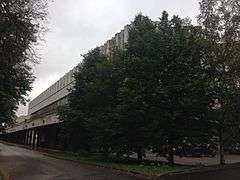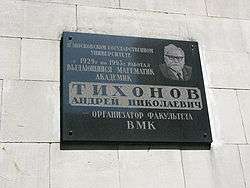MSU Faculty of Computational Mathematics and Cybernetics
MSU Faculty of Computational Mathematics and Cybernetics (CMC) (Russian: Факультет вычислительной математики и кибернетики (ВМК)), founded in 1970 by Andrey Tikhonov, is a part of Moscow State University.
 Building of MSU CMC | |
| Type | Public |
|---|---|
| Established | 1970 |
| Dean | Professor, Academician RAS Evgeny Moiseev |
| Location | Moscow , Russia |
| Campus | Urban |
| Affiliations | MSU |
| Website | en |
Education
CMC is the leading Russian research and training center in the fields of applied mathematics, computing and software development . Education at CMC combines in-depth theoretical studies, extensive practical exercises, and research.
Main 12 Master's programs:
- Mathematical physics
- Mathematical modeling
- Computational diagnostics
- Numerical methods
- Theory of probability and mathematical statistics
- Operations research and systems analysis
- Optimization and optimal control
- Mathematical cybernetics
- Software for computers and computer systems
- Networks software
- System programming
- Decision making in Economics and Finance
History

A group of professors and scholars from Department of Physics and Department of Mechanics and Mathematics led by Andrey Tikhonov founded CMC in 1970. The three departments are still closely connected.
The faculty houses the 33,072-processor Lomonosov supercomputer in Moscow and was ranked the 18th-fastest supercomputer in the world, and the third-fastest in Europe. The system was designed by T-Platforms, and used Xeon 2.93 GHz processors, Nvidia 2070 GPUs, and an Infiniband interconnect. Following companies work with CS MSU: Intel, Microsoft, Sun Microsystems, Borland, Software AG, Siemens, IBM/Lotus, Samsung, HP.
The deans of the faculty:
- Andrey Tikhonov (1970–1990)
- Dmitrij Kostomarov (1991–1999)
- Evgeny Moiseev (1999-2019)
- Igor Sokolov (since March 2019)
Structure
Departments
The faculty consists of 19 Academic departments:
| Department | Head | Year of creation |
|---|---|---|
| Department of Mathematical Physics | Alexander Denisov | 1982 |
| Department of Computational Technologies and Modeling | Evgeny Tyrtyshnikov | 2004 |
| Department of Computational Methods | Boris Chetverushkin | 1983 |
| Department of Automation for Scientific Research[1] | Aleksandr Popov | 1987 |
| Department of General Mathematics | 1973 | |
| Department of Functional Analysis and its Applications | Evgeny Moiseev | 2008 |
| Department of Nonlinear Dynamic Systems and Control Processes | Stanislav Emelyanov | 1989 |
| Department of Operations Research[2] | Alexander Vasin | 1970 |
| Department of Optimal Control | Yury Osipov | 1970 |
| Department of Systems Analysis | Aleksandr Kurzhanskij | 1992 |
| Department of Mathematical Statistics | Viktor Korolev | 1970 |
| Department of Mathematical Methods of Forecasting | Yuri Zhuravlyov | 1997 |
| Department of Mathematical Cybernetics | Valerij Alekseev | 1970 |
| Department of Information Security | Igor Sokolov | 2013 |
| Department of Computing Systems and Automation | 1970 | |
| Department of Supercomputers and Quantum Informatics | Vladimir Voevodin | 2012 |
| Department of Algorithmic Languages | Mihail Malkovskij | 1970 |
| Department of System Programming | Arutyun I. Avetisyan | 1970 |
| Department of Intellectual Information Technologies | Igor Mashechkin | 2017 |
| Department of English | Larisa Saratovskaya | 1990 |
Scientific laboratories
The faculty includes 18 research laboratories:
- Laboratory of Mathematical Physics
- Laboratory of Computational Electrodynamics
- Laboratory of Heat and Mass Transfer Processes Simulation
- Laboratory of Inverse Problems
- Laboratory of Mathematical Methods of Image Processing
- Laboratory of Mathematical Modeling in Physics
- Laboratory of Difference Methods
- Open Laboratory of Information Technologies
- Laboratory of Statistical Analysis
- Laboratory of Mathematical Problems of Computer Security
- Laboratory of Computational Practice and Information Systems
- The Computer Systems Laboratory
- Laboratory of Information Systems Security
- Computer Graphics and Multimedia Laboratory
- Laboratory of Programming Technologies
- Laboratory of Ternary Informatics
- Research Laboratory of Computational Modeling Tools
- Laboratory of Industrial Mathematics
Famous Рrofessors of the Faculty
Faculty staff consists of more than 550 professors and research scientists. The list of prominent scientists that worked in the Faculty of Computational Mathematics and Cybernetics includes:
- Lev Pontryagin, the founder and the first chair of the department of Optimal Control.
- Sergey Yablonsky, the founder and the first chair of the department of Mathematical Cybernetics.
- Oleg Lupanov, who was affiliated with the department of Mathematical Cybernetics and taught the undergraduate course on discrete mathematics.
- Yuriy Prokhorov, the chair of the department of Probability Theory and Mathematical Statistics.
- Guriy Marchuk, the chair of the department of Computational Technologies and Modeling.
Prominent scientists have worked and are working at the faculty in different years:
- Andrey Tikhonov (1970–1993)
- Lev Pontryagin (1970–1988)
- Sergey Yablonsky (1970–1998)
- Oleg Lupanov (1970–1980)
- Lev Korolyov (1970–2016)
- Yuriy Prokhorov (1970–2013)
- Guriy Marchuk (2004–2013)
- Nikolai Bakhvalov (1970–1981)
- Evgenij D'yakonov (1970–2006)
- Viktor Sadovnichiy (1981–1982)
- Yury Osipov (1989-now)
- Yuri Zhuravlyov (1997-now)
- Viktor Ivannikov (1994-2016)
Famous Graduates of the Faculty
- Sergei Abramov
- Nikolai Ardelyan
- Aram Arutyunov
- Sergei Aseev,
- Sergey Aslanyan
- Vladimir Bening
- Natalia Berloff
- Peter Brusilovsky
- Vasily Denisov
- Alexander Dyakonov
- Aleksey Ismailov
- Alexander Ilyin
- Dmitry Jakovenko
- Nikolai Kapustin
- Viktor Korolev
- Maria Korovina
- Andrei Krylov
- Igor Lomov
- Sergey Lozhkin
- Allan Martinson
- Igor Mashechkin
- Tikhon Moiseev
- Sergei Mukhin
- Yurii Nesterov
- Sergey Orlovskiy
- Mikhail Potapov
- Alexander Razgulin
- Svetlana Selezneva
- Irina Shevtsova
- Alexey Shishkin
- Sergey Shorgin
- Ruslan Smelyansky
- Igor Sokolov
- Sergey Solovyov
- Dmitry Sychugov
- Evgeny Tyrtyshnikov
- Alexander Vasin
- Vladimir Voevodin
- Andrey Voronenko
- Tatyana Yumasheva
- Vladimir Zakharov
- Fedor Zaytsev
References
Literature
- 20 years later (1985-2005): Graduates of the Olympic set - Festival edition: Collected essays. Moscow: MAX Press. Editor Matveeva A.N. 2005. p. 560. ISBN 5-317-01277-5.
- Faculty of Computational Mathematics and Cybernetics: History and Modernity: A Biographical Directory. Moscow: Publishing house of Moscow University. Author-compiler Evgeny Grigoriev. 2010. p. 616. ISBN 978-5-211-05838-5.
- 30 years later (1985-2015): Graduates of the Olympic set - Festival edition: Collected essays. Moscow: MAX Press. Editors Zhdaneeva L.A., Matveeva A.N., Mikhailova L.G. 2015. p. 704. ISBN 978-5-317-04999-7.
External links
| Wikimedia Commons has media related to MSU Faculty of Computational Mathematics and Cybernetics. |